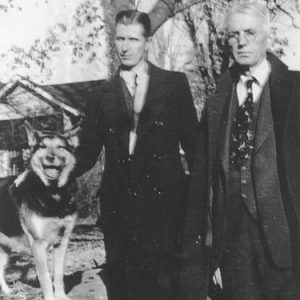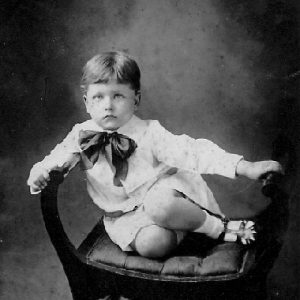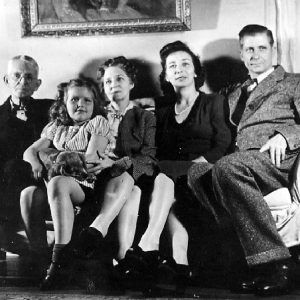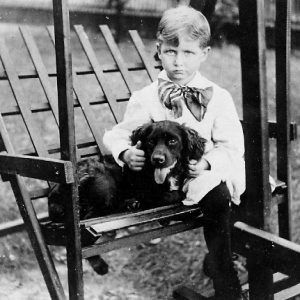calsfoundation@cals.org
John Quincy Wolf Jr. (1901–1972)
A college professor and self-trained folklorist, John Quincy Wolf Jr. left a lasting legacy in the mid-South folk music world through his intrepid collecting and field recording and his broad-ranging scholarship.
Wolf was born in Batesville (Independence County) on May 14, 1901, the younger of the two children of John Quincy Wolf Sr. and Adele Crouch Wolf. Known as Quincy to distinguish him from his banker father, he spent the first twenty-one years of his life in Batesville, earning his bachelor’s degree from Arkansas College (now Lyon College) in 1922. One year later, Wolf received an MA in English at Vanderbilt University and returned to his alma mater to teach English and history for much of the next decade, with occasional leaves of absence to pursue a doctorate at Johns Hopkins University. In 1931, he married former student and fellow Arkansas College employee Bess Millen of Malvern (Hot Spring County). After Wolf’s brief teaching appointments at Goucher College and the University of Wisconsin, the couple settled in 1937 in Memphis, Tennessee, where he would spend the rest of his career on the faculty of Southwestern at Memphis (now Rhodes College) and where the couple would raise their two daughters. Wolf completed his PhD at Johns Hopkins in 1946.
At Southwestern, Wolf eventually became chairman of the English department, a post he held for more than twenty years. Although his academic expertise lay in Romantic poetry, Wolf is best remembered as a pioneer in the teaching and collecting of folklore and folk music. Wolf began collecting mountain ballads as a college student, but it was only in the early 1950s, on summer and Christmas vacations back home in Arkansas, that he and his wife began recording folk singers and musicians. Wolf recorded more than 1,000 songs in the rural Ozarks, primarily within a fifty-mile radius of Batesville. Among his most significant “discoveries” were Almeda Riddle, Ollie Gilbert, and folk music legend Jimmy Driftwood, who credited Wolf with convincing him to audition for the Nashville producers who eventually signed him to a contract.
When rheumatoid arthritis restricted his mobility in the early 1960s, Wolf increasingly turned his attention to shape-note congregational singing in northern Mississippi and Alabama and finally to the blues music of the Memphis area. He recorded bluesmen Gus Cannon, Furry Lewis, and Bukka White and invited them to perform for his folk music classes at Southwestern. Wolf’s contemporaries recognized him as an authority on southern folk music. Alan Lomax consulted Wolf before making his 1959 recording trip to the Ozarks, and in the 1960s, promoters of the Newport Folk Festival in Rhode Island sought Wolf’s assistance in identifying and scheduling blues, Ozarks, and shape-note performers.
At the time of his death on March 14, 1972, Wolf had been collecting his father’s stories of growing up in the Ozarks in the years following the Civil War. Bess Wolf and Memphis State University (now University of Memphis) professor F. Jack Hurley shepherded those into publication as Life in the Leatherwoods in 1974. Nine years later, Bess Wolf, who had moved back to the Wolf family home in Batesville, donated Wolf’s collection of almost 500 audio tapes to the Regional Studies Center at Arkansas College. This rich legacy of Wolf’s passion for folk music is today available on the website of the Lyon College Regional Studies Center.
For additional information:
Hyde, Gene. “A Pioneer Ozark Folklorist: John Quincy Wolf, Jr.” Arkansas Democrat-Gazette, April 3, 1998, p. 1E.
John Quincy Wolf Jr. Collection. Regional Studies Center. Lyon College, Batesville, Arkansas. Online at https://www.lyon.edu/john-quincy-wolf-collection (accessed August 26, 2023).
Lankford, George E. “John Quincy Wolf, Jr.: An Appreciation.” Mid-America Folklore 13 (Winter/Spring 1985): 3–8.
Brooks Blevins
Lyon College
 John Quincy Wolf Jr. and Father
John Quincy Wolf Jr. and Father  John Quincy Wolf Jr.
John Quincy Wolf Jr.  Wolf Family
Wolf Family  John Quincy Wolf Jr.
John Quincy Wolf Jr. 



When the first battery-operated tape recorder was the size of suitcase, he sought music history way off the grid in the Ozarks to record unique remembered songs. He walked on the grass whenever possible. He loved and kept bird dogs and at least once walked out of the house with a parakeet on his shoulder. A quiet, lovely man.